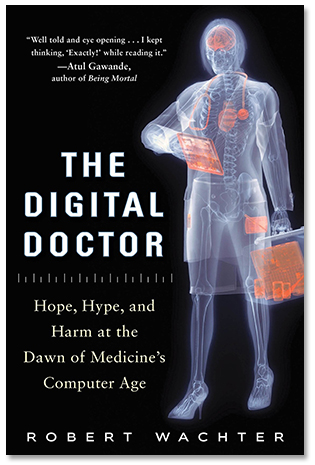The Digital Doctor, book review: A matter of life, death...and trust


Why, Robert Wachter asks at the beginning of The Digital Doctor: Hope, Hype, and Harm at the Dawn of Medicine's Computer Age, is healthcare IT so far behind that in other sectors? Part of his answer, of course, is that he's living and working in the US, where healthcare is such a complex patchwork of private practices, public and private hospitals, and chains of managed care providers, all overseen by insurance companies and government departments, that getting them all to agree on anything like standards for data exchange is hard. Plus, it may be natural for these professions, whose collaboration is all about personal relationships, to balk at disruption by technological mediation.
A case in point: in one hospital where electronic health records have been deployed, Wachter found that the loss of physical workflow indicators led administrators to create a fake stand-in for the paper chart whose movement from one slot to another triggered the next action in sequence. Yes, he says: electronic health records will force all kinds of change. But they are not an end in themselves, only an enabler. They launch a process of change that could not happen without them, but of which they are only a small piece. The much bigger change comes in the years after they arrive.
Near-Death by Robo-Doc
All of this makes perfect sense, as does the principle that everyone in the healthcare system should be operating as close as possible to "the top of their licence" -- more like the British system, where GPs are gatekeepers and specialists' time is reserved for the greatest need. System design should mean that egregious errors do not happen. His primary example of such an error is the case of Pablo Garcia, who was nearly killed by a 39-fold overdose prescribed by a robot because of a system design that failed to distinguish clearly between milligrams per pill and milligrams per kilo of patient body weight.
Wachter thinks medicine could learn from the aviation industry, which pays great attention to cockpit design to eliminate egregious errors. Especially, he says, everyone along the chain must be encouraged to "stop the line" whenever they feel uneasy. He's also deplores today's situation where doctors have stopped looking patients in the eye, focusing instead on their computer screens.
And yet...I'm less entranced with Wachter's closing vision of the future of healthcare. Only the very sickest patients are cared for in hospital (good), with consultations easily enabled by videoconferencing (OK). Most will be cared for "in the community" or at home (good, if it works), while the many fewer hospitals will be highly equipped hubs where every patient has ICU-level care. Here, I think Wachter may have lost sight of something: how exactly do patients' family members commute those distances for the family meetings he imagines taking place with specialists over video links? If nurses can monitor patients' status without entering their rooms, what human contact does the patient have?
This, however, seems minor compared to the general omission of security. Wachter is both a doctor (a 'hospitalist') and a diligent researcher. He interviews many dozens of people, attends conferences, reads journals, and learns up technology (before beginning this book, he admits, he didn't know an API from an APB). So he naturally focuses on medical errors. But the rising drumbeat of healthcare data breaches and the serious consequences of medical identity theft are going to be the first thing to solve. Otherwise, there's no trust -- and without trust, there's a severely damaged future for IT in healthcare.